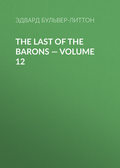
Эдвард Бульвер-Литтон
Lucretia — Volume 02
CHAPTER VII
THE ENGAGEMENT
It is somewhat less than three months after the death of Sir Miles St. John; November reigns in London. And "reigns" seems scarcely a metaphorical expression as applied to the sullen, absolute sway which that dreary month (first in the dynasty of Winter) spreads over the passive, dejected city.
Elsewhere in England, November is no such gloomy, grim fellow as he is described. Over the brown glebes and changed woods in the country, his still face looks contemplative and mild; and he has soft smiles, too, at times,—lighting up his taxed vassals the groves; gleaming where the leaves still cling to the boughs, and reflected in dimples from the waves which still glide free from his chains. But as a conqueror who makes his home in the capital, weighs down with hard policy the mutinous citizens long ere his iron influence is felt in the province, so the first tyrant of Winter has only rigour and frowns for London. The very aspect of the wayfarers has the look of men newly enslaved: cloaked and muffled, they steal to and fro through the dismal fogs. Even the children creep timidly through the streets; the carriages go cautious and hearse-like along; daylight is dim and obscure; the town is not filled, nor the brisk mirth of Christmas commenced; the unsocial shadows flit amidst the mist, like men on the eve of a fatal conspiracy. Each other month in London has its charms for the experienced. Even from August to October, when The Season lies dormant, and Fashion forbids her sons to be seen within hearing of Bow, the true lover of London finds pleasure still at hand, if he search for her duly. There are the early walks through the parks and green Kensington Gardens, which now change their character of resort, and seem rural and countrylike, but yet with more life than the country; for on the benches beneath the trees, and along the sward, and up the malls, are living beings enough to interest the eye and divert the thoughts, if you are a guesser into character, and amateur of the human face,—fresh nursery-maid and playful children; and the old shabby-genteel, buttoned- up officer, musing on half-pay, as he sits alone in some alcove of Kenna, or leans pensive over the rail of the vacant Ring; and early tradesman, or clerk from the suburban lodging, trudging brisk to his business,—for business never ceases in London. Then at noon, what delight to escape to the banks at Putney or Richmond,—the row up the river; the fishing punt; the ease at your inn till dark! or if this tempt not, still Autumn shines clear and calm over the roofs, where the smoke has a holiday; and how clean gleam the vistas through the tranquillized thoroughfares; and as you saunter along, you have all London to yourself, Andrew Selkirk, but with the mart of the world for your desert. And when October comes on, it has one characteristic of spring,—life busily returns to the city; you see the shops bustling up, trade flowing back. As birds scent the April, so the children of commerce plume their wings and prepare for the first slack returns of the season. But November! Strange the taste, stout the lungs, grief-defying the heart, of the visitor who finds charms and joy in a London November.
In a small lodging-house in Bulstrode Street, Manchester Square, grouped a family in mourning who had had the temerity to come to town in November, for the purpose, no doubt, of raising their spirits. In the dull, small drawing-room of the dull, small house we introduce to you, first, a middle-aged gentleman whose dress showed what dress now fails to show,—his profession. Nobody could mistake the cut of the cloth and the shape of the hat, for he had just come in from a walk, and not from discourtesy, but abstraction, the broad brim still shadowed his pleasant, placid face. Parson spoke out in him, from beaver to buckle. By the coal fire, where, through volumes of smoke, fussed and flickered a pretension to flame, sat a middle-aged lady, whom, without being a conjurer, you would pronounce at once to be wife to the parson; and sundry children sat on stools all about her, with one book between them, and a low whispered murmur from their two or three pursed-up lips, announcing that that book was superfluous. By the last of three dim- looking windows, made dimmer by brown moreen draperies, edged genteelly with black cotton velvet, stood a girl of very soft and pensive expression of features,—pretty unquestionably, excessively pretty; but there was something so delicate and elegant about her,—the bend of her head, the shape of her slight figure, the little fair hands crossed one on each other, as the face mournfully and listlessly turned to the window, that "pretty" would have seemed a word of praise too often proffered to milliner and serving-maid. Nevertheless, it was perhaps the right one: "handsome" would have implied something statelier and more commanding; "beautiful," greater regularity of feature, or richness of colouring. The parson, who since his entrance had been walking up and down the small room with his hands behind him, glanced now and then at the young lady, but not speaking, at length paused from that monotonous exercise by the chair of his wife, and touched her shoulder. She stopped from her work, which, more engrossing than elegant, was nothing less than what is technically called "the taking in" of a certain blue jacket, which was about to pass from Matthew, the eldest born, to David, the second, and looked up at her husband affectionately. Her husband, however, spoke not; he only made a sign, partly with his eyebrow, partly with a jerk of his thumb over his right shoulder, in the direction of the young lady we have described, and then completed the pantomime with a melancholy shake of the head. The wife turned round and looked hard, the scissors horizontally raised in one hand, while the other reposed on the cuff of the jacket. At this moment a low knock was heard at the street- door. The worthy pair saw the girl shrink back, with a kind of tremulous movement; presently there came the sound of a footstep below, the creak of a hinge on the ground-floor, and again all was silent.
"That is Mr. Mainwaring's knock," said one of the children.
The girl left the room abruptly, and, light as was her step, they heard her steal up the stairs.
"My dears," said the parson, "it wants an hour yet to dark; you may go and walk in the square."
"'T is so dull in that ugly square, and they won't let us into the green. I am sure we'd rather stay here," said one of the children, as spokesman for the rest; and they all nestled closer round the hearth.
"But, my dears," said the parson, simply, "I want to talk alone with your mother. However, if you like best to go and keep quiet in your own room, you may do so."
"Or we can go into Susan's?"
"No," said the parson; "you must not disturb Susan."
"She never used to care about being disturbed. I wonder what's come to her?"
The parson made no rejoinder to this half-petulant question. The children consulted together a moment, and resolved that the square, though so dull, was less dull than their own little attic. That being decided, it was the mother's turn to address them. And though Mr. Fielden was as anxious and fond as most fathers, he grew a little impatient before comforters, kerchiefs, and muffettees were arranged, and minute exordiums as to the danger of crossing the street, and the risk of patting strange dogs, etc., were half-way concluded; with a shrug and a smile, he at length fairly pushed out the children, shut the door, and drew his chair close to his wife's.
"My dear," he began at once, "I am extremely uneasy about that poor girl."
"What, Miss Clavering? Indeed, she eats almost nothing at all, and sits so moping alone; but she sees Mr. Mainwaring every day. What can we do? She is so proud, I'm afraid of her."
"My dear, I was not thinking of Miss Clavering, though I did not interrupt you, for it is very true that she is much to be pitied."
"And I am sure it was for her sake alone that you agreed to Susan's request, and got Blackman to do duty for you at the vicarage, while we all came up here, in hopes London town would divert her. We left all at sixes and sevens; and I should not at all wonder if John made away with the apples."
"But, I say," resumed the parson, without heeding that mournful foreboding,—"I say, I was then only thinking of Susan. You see how pale and sad she is grown."
"Why, she is so very soft-hearted, and she must feel for her sister."
"But her sister, though she thinks much, and keeps aloof from us, is not sad herself, only reserved. On the contrary. I believe she has now got over even poor Sir Miles's death." "And the loss of the great property!"
"Fie, Mary!" said Mr. Fielden, almost austerely.
Mary looked down, rebuked, for she was not one of the high-spirited wives who despise their husbands for goodness.
"I beg pardon, my dear," she said meekly; "it was very wrong in me; but I cannot—do what I will—I cannot like that Miss Clavering."
"The more need to judge her with charity. And if what I fear is the case, I'm sure we can't feel too much compassion for the poor blinded young lady."
"Bless my heart, Mr. Fielden, what is it you mean?"
The parson looked round, to be sure the door was quite closed, and replied, in a whisper: "I mean, that I fear William Mainwaring loves, not Lucretia, but Susan."
The scissors fell from the hand of Mrs. Fielden; and though one point stuck in the ground, and the other point threatened war upon flounces and toes, strange to say, she did not even stoop to remove the chevaux-de- frise.
"Why, then, he's a most false-hearted young man!"
"To blame, certainly," said Fielden; "I don't say to the contrary,— though I like the young man, and am sure that he's more timid than false. I may now tell you—for I want your advice, Mary—what I kept secret before. When Mainwaring visited us, many months ago, at Southampton, he confessed to me that he felt warmly for Susan, and asked if I thought Sir Miles would consent. I knew too well how proud the poor old gentleman was, to give him any such hopes. So he left, very honourably. You remember, after he went, that Susan's spirits were low,—you remarked it."
"Yes, indeed, I remember. But when the first shock of Sir Miles's death was over, she got back her sweet colour, and looked cheerful enough."
"Because, perhaps, then she felt that she had a fortune to bestow on Mr.
Mainwaring, and thought all obstacle was over."
"Why, how clever you are! How did you get at her thoughts?"
"My own folly,—my own rash folly," almost groaned Mr. Fielden. "For not guessing that Mr. Mainwaring could have got engaged meanwhile to Lucretia, and suspecting how it was with Susan's poor little heart, I let out, in a jest—Heaven forgive me!—what William had said; and the dear child blushed, and kissed me, and—why, a day or two after, when it was fixed that we should come up to London, Lucretia informed me, with her freezing politeness, that she was to marry Mainwaring herself as soon as her first mourning was over."
"Poor, dear, dear Susan!"
"Susan behaved like an angel; and when I broached it to her, I thought she was calm; and I am sure she prayed with her whole heart that both might be happy."
"I'm sure she did. What is to be done? I understand it all now. Dear me, dear me! a sad piece of work indeed." And Mrs. Fielden abstractedly picked up the scissors.
"It was not till our coming to town, and Mr. Mainwaring's visits to Lucretia, that her strength gave way."
"A hard sight to bear,—I never could have borne it, my love. If I had seen you paying court to another, I should have—I don't know what I should have done! But what an artful wretch this young Mainwaring must be."
"Not very artful; for you see that he looks even sadder than Susan. He got entangled somehow, to be sure. Perhaps he had given up Susan in despair; and Miss Clavering, if haughty, is no doubt a very superior young lady; and, I dare say, it is only now in seeing them both together, and comparing the two, that he feels what a treasure he has lost. Well, what do you advise, Mary? Mainwaring, no doubt, is bound in honour to Miss Clavering; but she will be sure to discover, sooner or later, the state of his feelings, and then I tremble for both. I'm sure she will never be happy, while he will be wretched; and Susan—I dare not think upon Susan; she has a cough that goes to my heart."
"So she has; that cough—you don't know the money I spend on black- currant jelly! What's my advice? Why, I'd speak to Miss Clavering at once, if I dared. I'm sure love will never break her heart; and she's so proud, she'd throw him off without a sigh, if she knew how things stood."
"I believe you are right," said Mr. Fielden; "for truth is the best policy, after all. Still, it's scarce my business to meddle; and if it were not for Susan— Well, well, I must think of it, and pray Heaven to direct me."
This conference suffices to explain to the reader the stage to which the history of Lucretia had arrived. Willingly we pass over what it were scarcely possible to describe,—her first shock at the fall from the expectations of her life; fortune, rank, and what she valued more than either, power, crushed at a blow. From the dark and sullen despair into which she was first plunged, she was roused into hope, into something like joy, by Mainwaring's letters. Never had they been so warm and so tender; for the young man felt not only poignant remorse that he had been the cause of her downfall (though she broke it to him with more delicacy than might have been expected from the state of her feelings and the hardness of her character), but he felt also imperiously the obligations which her loss rendered more binding than ever. He persuaded, he urged, he forced himself into affection; and probably without a murmur of his heart, he would have gone with her to the altar, and, once wedded, custom and duty would have strengthened the chain imposed on himself, had it not been for Lucretia's fatal eagerness to see him, to come up to London, where she induced him to meet her,—for with her came Susan; and in Susan's averted face and trembling hand and mute avoidance of his eye, he read all which the poor dissembler fancied she concealed. But the die was cast, the union announced, the time fixed, and day by day he came to the house, to leave it in anguish and despair. A feeling they shared in common caused these two unhappy persons to shun each other. Mainwaring rarely came into the usual sitting-room of the family; and when be did so, chiefly in the evening, Susan usually took refuge in her own room. If they met, it was by accident, on the stairs, or at the sudden opening of a door; then not only no word, but scarcely even a look was exchanged: neither had the courage to face the other. Perhaps, of the two, this reserve weighed most on Susan; perhaps she most yearned to break the silence,—for she thought she divined the cause of Mainwaring's gloomy and mute constraint in the upbraidings of his conscience, which might doubtless recall, if no positive pledge to Susan, at least those words and tones which betray the one heart, and seek to allure the other; and the profound melancholy stamped on his whole person, apparent even to her hurried glance, touched her with a compassion free from all the bitterness of selfish reproach. She fancied she could die happy if she could remove that cloud from his brow, that shadow from his conscience. Die; for she thought not of life. She loved gently, quietly,—not with the vehement passion that belongs to stronger natures; but it was the love of which the young and the pure have died. The face of the Genius was calm and soft; and only by the lowering of the hand do you see that the torch burns out, and that the image too serene for earthly love is the genius of loving Death.
Absorbed in the egotism of her passion (increased, as is ever the case with women, even the worst, by the sacrifices it had cost her), and if that passion paused, by the energy of her ambition, which already began to scheme and reconstruct new scaffolds to repair the ruined walls of the past,—Lucretia as yet had not detected what was so apparent to the simple sense of Mr. Fielden. That Mainwaring was grave and thoughtful and abstracted, she ascribed only to his grief at the thought of her loss, and his anxieties for her altered future; and in her efforts to console him, her attempts to convince him that greatness in England did not consist only in lands and manors,—that in the higher walks of life which conduct to the Temple of Renown, the leaders of the procession are the aristocracy of knowledge and of intellect,—she so betrayed, not generous emulation and high-souled aspiring, but the dark, unscrupulous, tortuous ambition of cunning, stratagem, and intrigue, that instead of feeling grateful and encouraged, he shuddered and revolted. How, accompanied and led by a spirit which he felt to be stronger and more commanding than his own,—how preserve the whiteness of his soul, the uprightness of his honour? Already he felt himself debased. But in the still trial of domestic intercourse, with the daily, hourly dripping on the stone, in the many struggles between truth and falsehood, guile and candour, which men—and, above all, ambitious men—must wage, what darker angel would whisper him in his monitor? Still, he was bound,—bound with an iron band; he writhed, but dreamed not of escape.
The day after that of Fielden's conference with his wife, an unexpected visitor came to the house. Olivier Dalibard called. He had not seen Lucretia since she had left Laughton, nor had any correspondence passed between them. He came at dusk, just after Mainwaring's daily visit was over, and Lucretia was still in the parlour, which she had appropriated to herself. Her brow contracted as his name was announced, and the maid- servant lighted the candle on the table, stirred the fire, and gave a tug at the curtains. Her eye, glancing from his, round the mean room, with its dingy horsehair furniture, involuntarily implied the contrast between the past state and the present, which his sight could scarcely help to impress on her. But she welcomed him with her usual stately composure, and without reference to what had been. Dalibard was secretly anxious to discover if she suspected himself of any agency in the detection of the eventful letter; and assured by her manner that no such thought was yet harboured, he thought it best to imitate her own reserve. He assumed, however, a manner that, far more respectful than he ever before observed to his pupil, was nevertheless sufficiently kind and familiar to restore them gradually to their old footing; and that he succeeded was apparent, when, after a pause, Lucretia said abruptly: "How did Sir Miles St. John discover my correspondence with Mr. Mainwaring?"
"Is it possible that you are ignorant? Ah, how—how should you know it?" And Dalibard so simply explained the occurrence, in which, indeed, it was impossible to trace the hand that had moved springs which seemed so entirely set at work by an accident, that despite the extreme suspiciousness of her nature, Lucretia did not see a pretence for accusing him. Indeed, when he related the little subterfuge of Gabriel, his attempt to save her by taking the letter on himself, she felt thankful to the boy, and deemed Gabriel's conduct quite in keeping with his attachment to herself. And this accounted satisfactorily for the only circumstance that had ever troubled her with a doubt,—namely, the legacy left to Gabriel. She knew enough of Sir Miles to be aware that he would be grateful to any one who had saved the name of his niece, even while most embittered against her, from the shame attached to clandestine correspondence.
"It is strange, nevertheless," said she, thoughtfully, after a pause, "that the girl should have detected the letter, concealed as it was by the leaves that covered it."
"But," answered Dalibard, readily, "you see two or three persons had entered before, and their feet must have displaced the leaves."
"Possibly; the evil is now past recall."
"And Mr. Mainwaring? Do you still adhere to one who has cost you so much, poor child?"
"In three months more I shall be his wife."
Dalibard sighed deeply, but offered no remonstrance.
"Well," he said, taking her hand with mingled reverence and affection,— "well, I oppose your inclinations no more, for now there is nothing to risk; you are mistress of your own fortune; and since Mainwaring has talents, that fortune will suffice for a career. Are you at length convinced that I have conquered my folly; that I was disinterested when I incurred your displeasure? If so, can you restore to me your friendship? You will have some struggle with the world, and, with my long experience of men and life, even I, the poor exile, may assist you."
And so thought Lucretia; for with some dread of Dalibard's craft, she yet credited his attachment to herself, and she felt profound admiration for an intelligence more consummate and accomplished than any ever yet submitted to her comprehension. From that time, Dalibard became an habitual visitor at the house; he never interfered with Lucretia's interviews with Mainwaring; he took the union for granted, and conversed with her cheerfully on the prospects before her; he ingratiated himself with the Fieldens, played with the children, made himself at home, and in the evenings when Mainwaring, as often as he could find the excuse, absented himself from the family circle, he contrived to draw Lucretia into more social intercourse with her homely companions than she had before condescended to admit. Good Mr. Fielden rejoiced; here was the very person,—the old friend of Sir Miles, the preceptor of Lucretia herself, evidently most attached to her, having influence over her,—the very person to whom to confide his embarrassment. One day, therefore, when Dalibard had touched his heart by noticing the paleness of Susan, he took him aside and told him all. "And now," concluded the pastor, hoping he had found one to relieve him of his dreaded and ungracious task, "don't you think that I—or rather you—as so old a friend, should speak frankly to Miss Clavering herself?"
"No, indeed," said the Provencal, quickly; "if we spoke to her, she would disbelieve us. She would no doubt appeal to Mainwaring, and Mainwaring would have no choice but to contradict us. Once put on his guard, he would control his very sadness. Lucretia, offended, might leave your house, and certainly she would regard her sister as having influenced your confession,—a position unworthy Miss Mivers. But do not fear: if the evil be so, it carries with it its inevitable remedy. Let Lucretia discover it herself; but, pardon me, she must have seen, at your first reception of Mainwaring, that he had before been acquainted with you?"
"She was not in the room when we first received Mainwaring; and I have always been distant to him, as you may suppose, for I felt disappointed and displeased. Of course, however, she is aware that we knew him before she did. What of that?"
"Why, do you think, then, he told her at Laughton of this acquaintance,— that he spoke of Susan? I suspect not."







